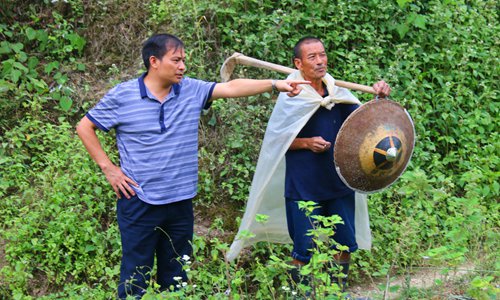
Lu Qun (left) speaks to a farmer about honeysuckle flower in Central China's Hunan Province on September 11, 2015. Photo: IC
Lu Qun is regarded by many on China's social media as an "anti-corruption hero."
In his verified Sina Weibo account, China's equivalent of Twitter, Lu, as an anti-graft official, dared to accuse the country's top-level officials of bribe-taking and he exposed corruption to the public. His outspoken manner has garnered him more than 230,000 followers.
Despite the praises netizens have given to him, Lu said that he doesn't regard himself as the "anti-corruption fighter" that some netizens think he is.
"I'm just an experienced discipline inspection and supervision official who dares to speak the truth and expose corruption issues," he told the Global Times modestly.
Lu, 47, a veteran anti-graft official, has worked in this field for 22 years.
His highest position is the deputy director of the Corruption Prevention Office at the Hunan Provincial Disciplinary Commission of the Communist Party of China (CPC), a Party organ that serves the country's anti-corruption drive, in Central China's Hunan Province.
He left the position two years ago and became the secretary of the commission for discipline inspection at a local State-owned financial company in Changsha, capital of Hunan.
One of the most striking moves in his career took place in 2014 when he accused the former head of China's Food and Drug Administration (CFDA) of corruption through Weibo.
He criticized the CFDA for reclassifying the southern-grown honeysuckle flower, a traditional Chinese medicine herb, as another type of herb which has lower medical value.
The reclassification drove down the price sharply and strained the finances of many farmers in southern China.
Lu claimed that the top official took bribes and did this on purpose to benefit the growers in East China's Shandong Province where the former CFDA head hails from. Lu said publicly back then that he was willing to sacrifice his government position to investigate the case.
The event aroused nationwide attention and heated discussion. But the CFDA's internal investigation result wasn't what Lu had expected.
Without any internal and external pressure, Lu still chose to leave his post in 2016, and then assumed a new position in local State-owned company.
Hailing from a rural family, Lu said that he still wanted to do more tangible work for vulnerable rural.
As an old hand, Lu stressed that any ruling party that doesn't speak strongly against corruption will lose public support and undermine its foundation.
"In this sense, our Party has a sober understanding of corruption and anti-corruption," he said.
According to Lu, anti-corruption work has made remarkable progress since the 18th CPC National Congress held in 2012.
He said that since the Party congress, the overall strategy has shifted to focusing on treating the symptoms first to win time for stemming corruption at the source. The Party takes a zero-tolerance and unrestricted-area approach to fighting corruption.
"In terms of new methods, we improve the Party style of work and crack down on both 'tigers' and 'flies,'" he said.
He praised the new inspection policy in which the higher Party institutions inspected the lower ones to find traces of corruption. "This effectively supplements the traditional method that purely depended on the reports of ordinary people," he said.
The Xinhua News Agency reported that more than 1.5 million corrupt officials have been punished and a total number of 440 centrally administrative senior officials have been investigated by the disciplinary arm of the CPC since November 2012.
In Lu's opinion, the stricter Party discipline enforced after the 18th CPC National Congress is meaningful.
"Adhering to the principle that the Party discipline should be stricter than the law is an essential lesson in strengthening Party self-discipline," he said.
In 2016, the CPC Central Committee institutionalized the experiences from the four years' anti-graft campaign and unveiled two stricter-than-ever sets of internal discipline measures. They are applied to both officials and ordinary members of the Party.
Xinhua reported that a public poll showed that Chinese people's satisfaction with anti-corruption efforts rose from 75 percent in 2012 to 94 percent by 2017.
